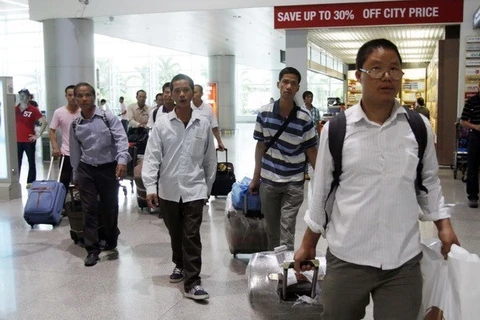 Workers take a Korean language examination to work in the Republic of Korea. In 2019, the RoK received 7,215 Vietnamese workers. (Photo: VietnamPlus)
Workers take a Korean language examination to work in the Republic of Korea. In 2019, the RoK received 7,215 Vietnamese workers. (Photo: VietnamPlus)
Hanoi (VNA) - Apart from focusing on the maintenance of traditional markets such as Japan, the Republic of Korea (RoK), and China’s Taiwan, the Ministry of Labor, War Invalids and Social Affairs is promoting the development of some new labour markets in Europe.
Tong Hai Nam, director of the Department of Overseas Labour Administration under the ministry, told VietnamPlus reporters that 2019 was the sixth consecutive year that the number of Vietnamese guest workers surpassed 100,000.
The country aims to send 130,000 labourers to work abroad, mainly in high-income markets.
The Ministry of Labour, War Invalids and Social Affairs will further increase the training work and make it easier for workers in disadvantaged regions to access information about overseas work.
Nam added that Japan continued leading in the labour market in 2019 with the reception of over 80,000 Vietnamese workers, followed by China’s Taiwan (54,480), the Republic of Korea (7,215), Romania (1,400), and Saudi Arabia (1,357).
In 2020, Vietnam aims to send 130,000 workers to work abroad, focusing on high-income and stable markets.
Besides maintaining traditional markets such as Japan, the Republic of Korea and Taiwan, the ministry is promoting the development of some new markets in Europe like Bulgaria, Hungary and Germany. These markets are creating more job opportunities for Vietnamese employees, according to Nam.
He explained that many European countries are facing labour shortage due to high urbanisation and aging population. Therefore, some are considering cooperation to receive Vietnamese workers.
The ministry is building strategies to reinforce traditional markets and expand new demanding ones, including Germany, he said, adding that in 2020, the ministry will sign cooperation agreements with German labour agencies to receive Vietnamese skilled workers to work in 12-13 sectors that the host country is in need.
“If we can access the German market, this will serve as a gateway to bring workers to Europe.”
 Tong Hai Nam, Director of the Department of Overseas Labour Administration under the Ministry of Labour, War Invalids and Social Affairs, at a new year meeting. (Photo: VietnamPlus)
Tong Hai Nam, Director of the Department of Overseas Labour Administration under the Ministry of Labour, War Invalids and Social Affairs, at a new year meeting. (Photo: VietnamPlus) In addition to Germany, Romania also emerged as a market in Europe that received an increasing number of Vietnamese workers in 2019. In previous years, Romania received about 300 - 400 Vietnamese workers per year, but in 2019, it the figure amounted to over 3,400.
Other markets in the East Europe have labour partnerships with Vietnam are the Czech Republic, Slovakia, Hungary, and Poland.
Nam said to set foot in the European market, labour export firms and guest workers have to face a lot of difficulties and strict requirements.
“This is also a major challenge for the ministry in 2020,” he said.
According to Nam, many Vietnamese businesses have been actively seeking contracts and developing foreign labour markets, as well as making proper investment in training skills for workers, improving their foreign language proficiency, and fostering necessary knowledge before going to work abroad.
In 2019, the ministry’s Department of Overseas Labour Administration received application for new licenses from 112 labour businesses. Currently, the total number of businesses licensed to send Vietnamese workers abroad is 421.
The Ministry of Labour, War Invalids and Social Affairs has intensified inspections of operational efficiency of businesses. The ministry’s Department of Overseas Labour Administration has conducted 25 periodical and sudden inspections, while working with the ministry’s inspection department to check 30 labour export firms, handling violations of 21 businesses and withdrawing licenses of two others. The total fine was about 1.5 billion VND (64,720 USD).
Only eligible businesses are licensed while violating ones will be strictly punished to ensure the quality of Vietnamese workers abroad, Nam affirmed./.
























